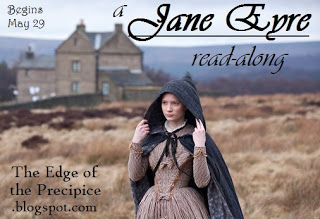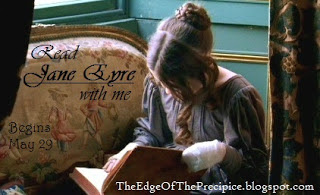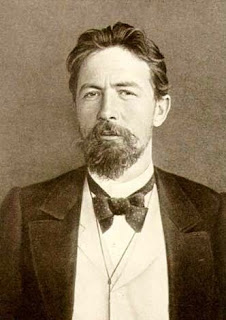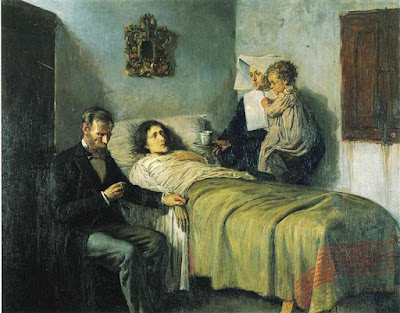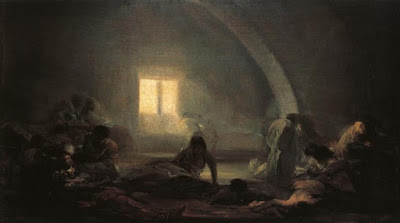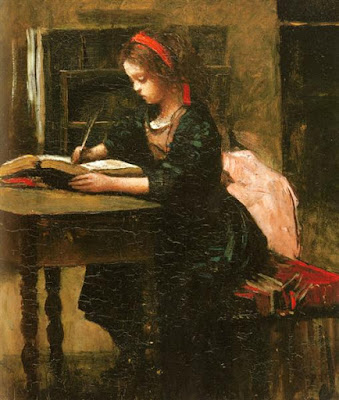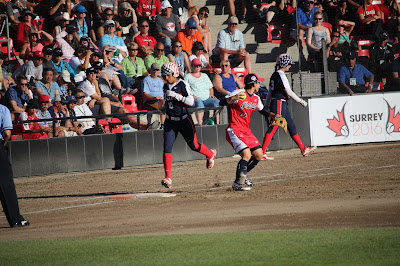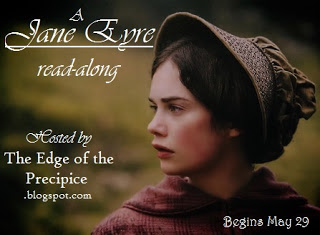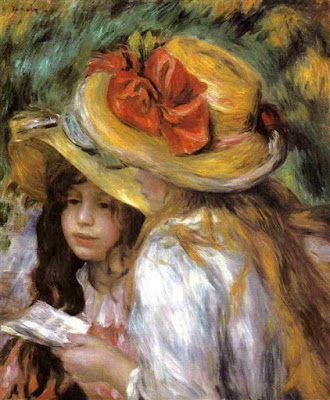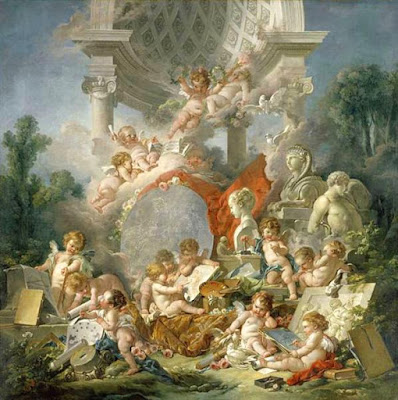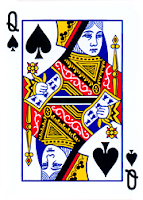Chapter XI
Brontë begins this chapter by likening the novel to a play and encourages the reader to not only read the story, but “see” it in their mind’s eye, as if it is being acted out on stage. It is a chilly October day as she waits for someone to meet her, feeling small and forgotten. But soon a conveyance arrives and she is taken the six miles to Thornfield at a frustratingly slow pace. Taken inside, she makes the acquaintance of Mrs. Fairfax and clears up her mistaken assumption that her pupil is Mrs. Fairfax’s daughter, instead learning the lady is only a servant, and Miss Adèle Varens is the ward of the owner of Thornfield, Mr. Edward Rochester. As Jane wakes the following morning with risen spirits, the reader finally gets a description of Thornfield, not overly grand, but picturesque in its location. Jane meets her student, Adèle, finding her pleasing, yet undisciplined towards work. As to Thornfield’s owner, Mr. Rochester, she is told that he is frequently absent and is “peculiar”, but is unable to discover his peculiarities. And near the end of the chapter while she is being given a tour of the house, Jane hears a loud laugh that chills her to the bone. Mrs. Fairfax claims it is the laugh of a servant, Grace Pool, but those who have read Jane Eyre before know better, don’t we?
 |
| A Manor House in Autumn John Atkinson Grimshaw source Wikiart |
Brontë emphasizes Jane’s isolation, as she is now like a ship “cut adrift from every connection, uncertain whether the port of which it is bound can be reached, and prevented by many impediments from returning to that it has quitted.”
Strangely we get no description of Thornfield upon Jane’s first site of it, only the mention of gates, a house, and the front door opened by a maidservant.
After chill, and cold, and mist and generally a gloomy description of Jane’s setting throughout the book so far, I wonder if the scene of her waking at Thornfield is a sign of improved circumstance:
“…… The chamber looked such a bright little place to me as the sun shone in between the gay blue chintz window curtains, showing papered walls and a carpeted floor, so unlike the bare planks and stained plaster of Lowood that my spirits rose at the view. Externals have a great effect on the young: I thought that a fairer era of life was beginning for me, one that was to have its flowers and pleasures, as well as its thorns and toils.”
Chapter XII
Jane takes quickly to her new situation and while she appears content with her work, it is apparent that she longs for experience outside of her comfortable life:
“Anybody may blame me who likes when I add further that now and then, when I took a walk by myself in the grounds, when I went down to the gates and looked through them along the road, or when, while Adèle played with her nurse, and Mrs. Fairfax made jellies in the storeroom, I climbed the three staircases, raised the trap-door of the attic, and having reached the leads, looked out afar over sequestered field and hill, and long dim sky-line —- that then I longed for a power of vision which might overpass that limit; which might reach the busy world, towns, regions full of life I had heard of but never seen: that then I desired more of practical experience than I possessed, more of intercourse with my kind, of acquaintance with variety of character, than was here within my reach …….. Who blames me? Many, no doubt; and I shall be called discontented. I could not help it: the restlessness was in my nature; it agitated me to pain sometimes ……. It is in vain to say human beings ought to be satisfied with tranquility: they must have action; and they will make it if they cannot find it. Millions are condemned to a stiller doom than mine, and millions are in silent revolt against their lot. Nobody knows how many rebellions besides political rebellions ferment in the masses of life but women feel just as men feel; they need exercise for their faculties and a field for their efrorts as much as their brothers do; they suffer from too rigid a restraint, too absolute a stagnation, precisely as men would suffer; and it is narrow-minded in their more privileged fellow creatures to say that they ought to confine themselves to making puddings and knitting stockings, to playing on the piano and embroidering bags. It is thoughtless to condemn them, or laugh at them, if they seek to do more or learn more than custom has pronounced necessary for their sex.”
And thus, remembering the thrill at Grace Pool’s first laugh, she becomes interested in the servant, as her behaviour is something out of the ordinary.
Three months passes and out of a chilly January afternoon walk, Jane encounters the foreboding sight of a dark rider on a tall horse which, after passing her by, slips on the ice on the causeway, causing a fall. Summoned by the rider’s huge dog, Jane offers her assistance, only to find that her new acquaintance is rough, ill-humoured, cross and demanding. Jane employs her usual quiet tact, get him seated again and on his way. While the encounter could not be considered pleasant, there was something exciting in the meeting and Jane is reluctant to return to Thornfield and its stagnant predictability. Eventually she enters, only to discover that the man she’d asssisted was in fact Mr. Rochester, her employer.
 |
| The First Meeting of Jane Eyre & Mr. Rochester (1914) Thomas Davidson source ArtUK |
There is such a resonance of Jane’s searching for a meaning to life outside of social expectations, that is almost a physical desire within her. One wonders if her attractions to Mr. Rochester will come, not because of his traits, but more because those traits also strain against those standards. While in many ways, they are very different, Jane’s ready discernment recognizes a kindred spirit.
Chapter XIII
Jane and Adèle are summoned to tea with Mr. Rochester. Let’s pause a moment and examine his description:
“…… I traced the general points of middle height, and considerable breadth of chest. He had a dark face, with stern features and a heavy brow; his eyes and gathered eyebrows looked ireful and thwarted just now; he was past youth, but had not reached middle age; perhaps thirty-five (from Chapter XII) ……. I knew my traveller with his broad and jetty eyebrows; his square forehead, made squarer by the horizontal sweep of his black hair. I recognised his decisive nose, more remarkable for character than beauty; his full nostrils, denoting, I thought, choler, his grim mouth, chin, and jaw — yes, all three were very grim, and no mistake. His shape, now divested of cloak, I perceived harmonised in squareness with his physiognomy: I suppose it was a good figure in the athletic sense of the term — broad chested and thin-flanked, though neither tall nor graceful.”
And so through their tea-time conversation, Rochester learns that Jane is not a creature of convention, her conversation being at once meek yet pointed, quiet, yet stimulating, and her character respectable and admirable. He inquires as to her history, examines her sketches, of which the reader is given a detailed description and questions her mood at their composition. Abruptly he ends their tête-a-tête, and Jane finds out through Mrs. Fairfax that Rochester had an older brother now dead, Rowland Rochester, who conspired with their father to make Rochester’s life difficult in that the younger brother was never supported in a living. It is wondered if this is the reason that Rochester is rarely at Thornfield.
 |
| Cloud over the calm sea (1877) Ivan Aivazovsky source Wikiart |
I wondered at the extensive description of Jane’s watercolour sketches. There is always something disquieting in them, such as a shipwreck, a corpse, twilight, dishevelled hair, a cold iceberg, a giant head and black drapery. And always there is a suggestion of a woman, whether it be a bracelet, a fair arm, a woman’s bust, a bloodless brow, a ring ……. A woman and doom …. hmmm ……..
In the last chapter, while we saw Jane engaging easily with Rochester because of his unconventionality, in this chapter we experience the reverse. He is becoming fascinated with her because of her sincerity, conviction, insight and her willingness to be herself in spite of conventionality. The story is becoming even more interesting!

